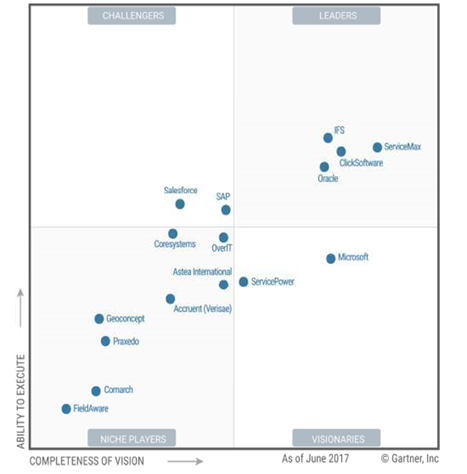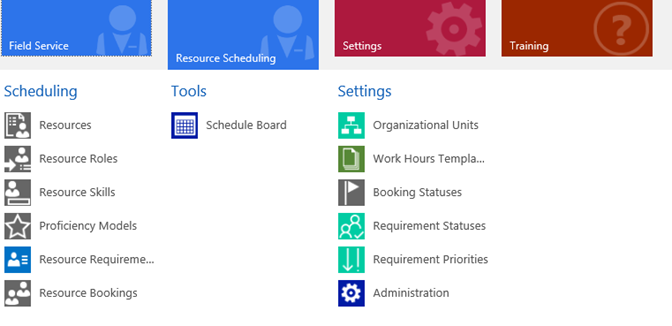Gartner Report for Dynamics 365 Field Service Management
Gartner is a world leading research and advisory firm who provides Information technology insights for IT and other business leaders around the world. The Gartner Magic Quadrant is a culmination of research in a specific market, which helps you ascertain how well technology providers are executing their stated visions and how well they are performing against the competition. This article will provide a synopsis of their review of Field Service Management using the Magic Quadrant.
Magic Quadrant for Field Service Management (FSM)

Field Service Management
Field service management (FSM) is any system that is designed to keep track of various components of field operations. Field service operations typically dispatch technicians to customer locations to provide installation, repair or maintenance services for equipment or systems. These may be actively managed, maintained and monitored under a predefined service or maintenance contract.
The field service module for Dynamics 365 provides a complete Field Service management solution, including service locations, customer assets, preventative maintenance, work order management, resource management, product inventory, scheduling and dispatch, mobility, collaboration, customer billing, and analytics.


Vendor Strength and Cautions
Microsoft is a Visionary on the basis of the breadth of capabilities it offers on a single platform, its sales traction, and its introduction of new hardware and software technologies into field service use cases. Its Dynamics 365 for Field Service product is best-suited to use cases where there is a blend of long-cycle and short-cycle service, parts management requirements, and remote support needs for both connected equipment and inexperienced technicians.
Microsoft’s strongest areas in terms of sales execution are service sectors such as HVAC and construction, but it also has traction in retail, manufacturing and healthcare. We estimate that Microsoft has between 75,000 and 95,000 active FSM users, mainly in North America and EMEA
As with any product there are Strengths and Weaknesses to be considered. The Gartner Report September 2017 lists Microsoft’s Strengths and Cautions as it pertains to Field Service Management as follows;
STRENGTHS
Sales execution: Microsoft has made investments in customer and partner programs, as well as an aggressive product development roadmap, as a result of significant growth in license sales and active users.
Product breadth: Dynamics 365 for Field Service covers end-to-end service, including capabilities not found in many competing solutions, such as predictive equipment maintenance management and contract, depot repair and inventory management.
Platform: Microsoft’s screen extensibility and workflow modification tools are automatically available to Dynamics 365 for Field Service users and to users of its new first-party mobile app.
Innovation: Microsoft has made major investments in its connected field service “story” (Azure IoT integration with customer service “cases” and field service “work orders”), technician remote support, augmented reality (native app integration with Microsoft HoloLens) and schedule optimization (long-cycle and short-cycle service).
CAUTIONS
Implementation execution: reference customers scored Microsoft’s deployment, cost of training and implementation (which is provided primarily by partners) among the lowest of the vendors in this Magic Quadrant. Microsoft indicates that it has increased its partner enablement and certification programs to improve its execution.
Product depth: Organizations with high-volume and high-volatility work order scheduling environments may need to consider products from vendors that offer more advanced schedule optimization. Also, although a Power BI solution template is now available, Dynamics 365 for Field Service lacks maturity in terms of built-in dashboards.
Mobile app transition: Microsoft has released a first-party mobile app on its own platform that will ultimately replace the previous version, which used a third-party platform. However, key capabilities, such as availability of functionality while offline and simplified deployment and configuration, have yet to be released for the new app, although they are on the short-term roadmap. Microsoft is currently offering customers a choice of which app to deploy.
Microsoft is currently a visionary on the Magic Quadrant. Visionaries lead many competitors in terms of technology, functionality or business model innovation. They influence or have strong potential influence in the direction of the FSM market. With Microsoft’s commitment and aggressive investment in FSM there is no doubt, that as they continue to mature in execution they will find themselves in the Leaders, Challengers or Niche Players space.
Learn more
We here at Vox Ism are very excited about the aggressive investments Microsoft is making in Field Service Management. We would welcome the opportunity to share this enthusiasm with you, by showing you how the Dynamics 365 field service module will help you transform your business, making it more productive, efficient and profitable.
If you would like to see Field Service Software in action, please join us at the Microsoft Canada Office on Tuesday March 20th, from 1:30 to 3 PM
https://voxism.com/webinars/upgrade-to-dynamics-365-2018-mar-20/